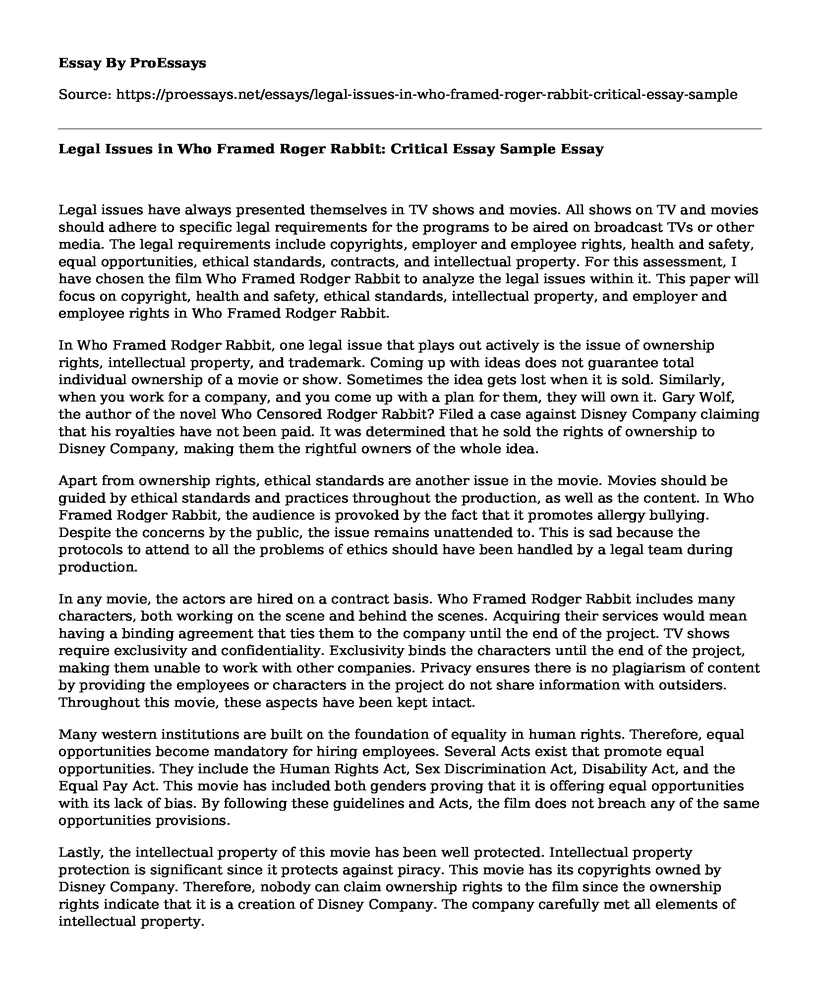Legal issues have always presented themselves in TV shows and movies. All shows on TV and movies should adhere to specific legal requirements for the programs to be aired on broadcast TVs or other media. The legal requirements include copyrights, employer and employee rights, health and safety, equal opportunities, ethical standards, contracts, and intellectual property. For this assessment, I have chosen the film Who Framed Rodger Rabbit to analyze the legal issues within it. This paper will focus on copyright, health and safety, ethical standards, intellectual property, and employer and employee rights in Who Framed Rodger Rabbit.
In Who Framed Rodger Rabbit, one legal issue that plays out actively is the issue of ownership rights, intellectual property, and trademark. Coming up with ideas does not guarantee total individual ownership of a movie or show. Sometimes the idea gets lost when it is sold. Similarly, when you work for a company, and you come up with a plan for them, they will own it. Gary Wolf, the author of the novel Who Censored Rodger Rabbit? Filed a case against Disney Company claiming that his royalties have not been paid. It was determined that he sold the rights of ownership to Disney Company, making them the rightful owners of the whole idea.
Apart from ownership rights, ethical standards are another issue in the movie. Movies should be guided by ethical standards and practices throughout the production, as well as the content. In Who Framed Rodger Rabbit, the audience is provoked by the fact that it promotes allergy bullying. Despite the concerns by the public, the issue remains unattended to. This is sad because the protocols to attend to all the problems of ethics should have been handled by a legal team during production.
In any movie, the actors are hired on a contract basis. Who Framed Rodger Rabbit includes many characters, both working on the scene and behind the scenes. Acquiring their services would mean having a binding agreement that ties them to the company until the end of the project. TV shows require exclusivity and confidentiality. Exclusivity binds the characters until the end of the project, making them unable to work with other companies. Privacy ensures there is no plagiarism of content by providing the employees or characters in the project do not share information with outsiders. Throughout this movie, these aspects have been kept intact.
Many western institutions are built on the foundation of equality in human rights. Therefore, equal opportunities become mandatory for hiring employees. Several Acts exist that promote equal opportunities. They include the Human Rights Act, Sex Discrimination Act, Disability Act, and the Equal Pay Act. This movie has included both genders proving that it is offering equal opportunities with its lack of bias. By following these guidelines and Acts, the film does not breach any of the same opportunities provisions.
Lastly, the intellectual property of this movie has been well protected. Intellectual property protection is significant since it protects against piracy. This movie has its copyrights owned by Disney Company. Therefore, nobody can claim ownership rights to the film since the ownership rights indicate that it is a creation of Disney Company. The company carefully met all elements of intellectual property.
Cite this page
Legal Issues in Who Framed Roger Rabbit: Critical Essay Sample. (2023, Mar 12). Retrieved from https://proessays.net/essays/legal-issues-in-who-framed-roger-rabbit-critical-essay-sample
If you are the original author of this essay and no longer wish to have it published on the ProEssays website, please click below to request its removal:
- Are Celebrities Entitled to a Private Life?
- Persuasive Essay on Business Analysis Paper Example
- 'Queer Eye' TV Show Essay Example
- Artistic Street Essay Example
- Research Paper on Unlock Social Media's Power: Engaging Communities to Share Ideas & Opinions
- Essay Example on The Europa 2013 Movie
- Movie Analysis Essay on The Yellow Earth, Timbuktu and The Red Sorghum







